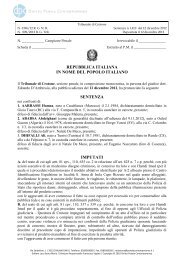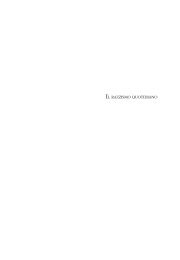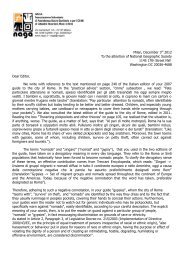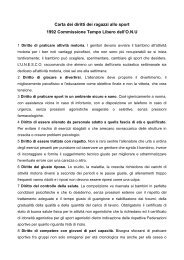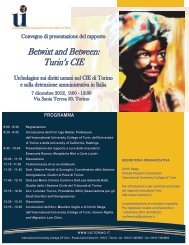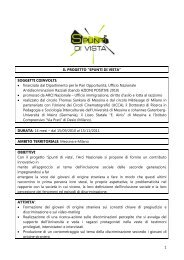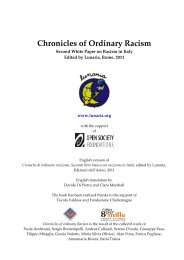Chronicles of ordinary racism 2011 - Cronache di ordinario razzismo
Chronicles of ordinary racism 2011 - Cronache di ordinario razzismo
Chronicles of ordinary racism 2011 - Cronache di ordinario razzismo
- No tags were found...
Create successful ePaper yourself
Turn your PDF publications into a flip-book with our unique Google optimized e-Paper software.
(e) points out that there is no empirical correspondence between what a person can<br />
do and the criteria outlined for a given level <strong>of</strong> the Cefr;<br />
(f) takes issue with the fact that citizenship can be denied on the grounds <strong>of</strong> failure<br />
to pass a language test based on the Cefr. 161<br />
Plurilingualism by hook or monolingualism by crook<br />
The social acceptance <strong>of</strong> a symbolic, punitive law was rendered easier – as well as by<br />
the ethic‐civic con<strong>di</strong>tions in which we live – by the typically backward attitude <strong>of</strong> Italian<br />
culture on the subject <strong>of</strong> communicative skills. One imagines that, in order to achieve<br />
social cohesion, it is necessary to impose a strongly structured language, free <strong>of</strong> internal<br />
tensions and <strong>of</strong> <strong>di</strong>astratic, <strong>di</strong>atopic and <strong>di</strong>amesic <strong>di</strong>fferences. There is a tendency to<br />
underestimate the plurality <strong>of</strong> <strong>di</strong>alects, strata and registers <strong>of</strong> what we know as the<br />
“Italian language”. We find it hard to accept that “[…] the normal linguistic status <strong>of</strong><br />
any speaker will be bilingual […]. Next to bi/(multi)lingualism correspon<strong>di</strong>ng to the<br />
code‐switching between two (or more) languages by the same speaker, linguistic<br />
variation and the knowledge <strong>of</strong> other languages also relates to the alternating between<br />
style‐, register‐ and situation‐based varieties which is charachteristic <strong>of</strong> any speaker.<br />
From this we can infer that there are, strictly speaking, no monolingual speakers”. 162 We<br />
do, however, attempt to impose this forced monolingualism on those who come from<br />
abroad and already interact with natives, adapting their own habits and helping to<br />
enrich well‐established ones. 163 The tenacity with which other institutions try to flatten<br />
any hint <strong>of</strong> variety in language, thought and behaviour is extended to these new<br />
arrivals, making them sit tests that are not able to assess their communication skills, but<br />
rather <strong>of</strong>fer boxes to tick, in order to prove that we know what is required by the people<br />
in charge <strong>of</strong> marking who are sadly underqualified, thanks to the decree: the latter, in<br />
order to continue in his badly‐paid job, will grow to hate it more and more and with it<br />
any obstacle that might get in the way and that would lead him to question its<br />
unsubstantiated assertions. The knowledge <strong>of</strong> a limited, flat language cannot be a<br />
con<strong>di</strong>tion for social inclusion: on the contrary, within the linguistic sphere <strong>of</strong><br />
communication a plural, adapted language will be born, more as a result than as a<br />
premise <strong>of</strong> a good inclusion process. 164<br />
It is worrying that academic experts in search <strong>of</strong> a social mandate (or an assignment),<br />
who go to work everyday, queue behind a counter, etc, remains largely inexplicable. In a collective intercession,<br />
Van Avermaet points out that “an apparently friendly, <strong>di</strong>rect and simple approach, actually entails the choice <strong>of</strong> a<br />
level without any obvious basis or validation” (G. Extra, M. Spotti, P. Van Avermaet, Introduction, in G. Extra, M.<br />
Spotti, P. Van Avermaet (e<strong>di</strong>t by), Language Testing, Migration and Citizenship: Cross-national Perspectives,<br />
Continuum 2009, p. 17).<br />
161 This is equally true for recognition <strong>of</strong> “lesser” rights such as the “long-term permit” paper.<br />
162 M. R. Manzini, L. M. Savoia, Work Notes on Romance Morphosyntax. Appunti <strong>di</strong> morfosintassi romanza,<br />
E<strong>di</strong>zioni dell’Orso 2008.<br />
163 “[…] the CEFR, which is essentially meant as a tool to promote plurilingualism, is used by some policy makers<br />
as a scientific justification to promote monolingualism in <strong>of</strong>ficial state languages and to focus more on what<br />
newcomers lack than on what they might be able to contribute and add in terms <strong>of</strong> resources to a more <strong>di</strong>verse<br />
society.” ( G. Extra, M. Spotti, P. Van Avermaet, Introduction, in G. Extra, M. Spotti, P. Van Avermaet (a cura <strong>di</strong>),<br />
Language Testing, Migration and Citizenship: Cross-national Perspectives, Continuum 2009, p. 18).<br />
164 “Language is crucial for integration but not necessarily a con<strong>di</strong>tion for integration, sometimes a result. Language<br />
and integration are intertwined, go hand in hand.” (P. Van Avermaet 24/25-06-2010, Language requirements for<br />
adult migrants. Results <strong>of</strong> a survey. Observations and challenges,<br />
http://www.coe.int/t/dg4/linguistic/source/ConfMigr10_P-VanAvermaet_survey.ppt)<br />
59




